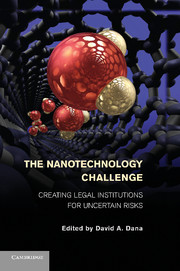Book contents
- Frontmatter
- Contents
- Contributors
- Part I Introduction
- Part II Public Perceptions of Nanotechnology Risks
- Part III Meeting the Nanotechnology Challenge by Creating New Legal Institutions
- 5 Toward Risk-Based, Adaptive Regulatory Definitions
- 6 The Missing Market Instrument
- 7 Conditional Liability Relief as an Incentive for Precautionary Study
- 8 Transnational New Governance and the International Coordination of Nanotechnology Oversight
- 9 Labeling the Little Things
- 10 Public Nuisance
- 11 Enlarging the Regulation of Shrinking Cosmetics and Sunscreens
- 12 Accelerating Regulatory Review
- 13 The Ethical Issues in Nanotechnology
- Part IV Where We Are Now – The Current Framework for Nanotechnology Regulation
- Index
- References
5 - Toward Risk-Based, Adaptive Regulatory Definitions
Published online by Cambridge University Press: 05 December 2011
- Frontmatter
- Contents
- Contributors
- Part I Introduction
- Part II Public Perceptions of Nanotechnology Risks
- Part III Meeting the Nanotechnology Challenge by Creating New Legal Institutions
- 5 Toward Risk-Based, Adaptive Regulatory Definitions
- 6 The Missing Market Instrument
- 7 Conditional Liability Relief as an Incentive for Precautionary Study
- 8 Transnational New Governance and the International Coordination of Nanotechnology Oversight
- 9 Labeling the Little Things
- 10 Public Nuisance
- 11 Enlarging the Regulation of Shrinking Cosmetics and Sunscreens
- 12 Accelerating Regulatory Review
- 13 The Ethical Issues in Nanotechnology
- Part IV Where We Are Now – The Current Framework for Nanotechnology Regulation
- Index
- References
Summary
Nanomaterials containing nanoparticles and nanoparticles themselves are now a focus of regulatory attention both in the United States and in various jurisdictions throughout the world. One of the motivations for developing regulation is the body of scientific studies suggesting that certain nanomaterials could pose environmental, health, or safety risks, but these studies are relatively few in number and involve only a relatively small number of nanomaterials in particular contexts. The studies may indicate that certain nanomaterials pose possible risks warranting at least some form of supervision by regulators, but they do not provide a generalized basis for presuming possible risk from all very small – or nanoscale – materials. The central challenge of developing a regulatory definition for nanomaterials is to be broad enough that it encompasses those materials that plausibly may exhibit the risk-creating properties that have led to the calls for regulation of nanomaterials in the first place without sweeping in many materials that plausibly cannot be expected to display such properties.
An overly broad definition for regulatory purposes is undesirable because it adds to the regulatory compliance costs of industry without producing corresponding environmental, health, or safety benefits. Moreover, an overly broad definition may result in an information overload on the part of regulators, which may delay regulators’ ability to evaluate data and to develop substantive regulatory measures to reduce environmental, health, and safety risk. To borrow from Cass Sunstein, overregulation may lead to under- or ineffective regulation.
- Type
- Chapter
- Information
- The Nanotechnology ChallengeCreating Legal Institutions for Uncertain Risks, pp. 105 - 116Publisher: Cambridge University PressPrint publication year: 2011



